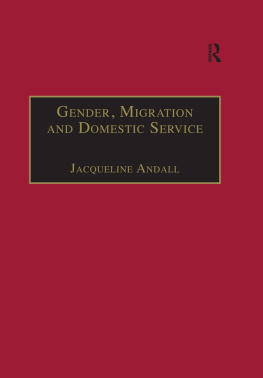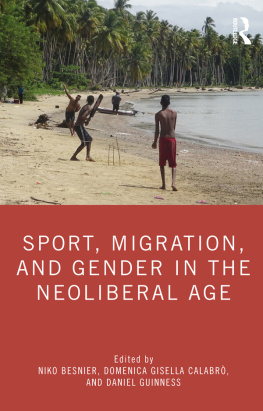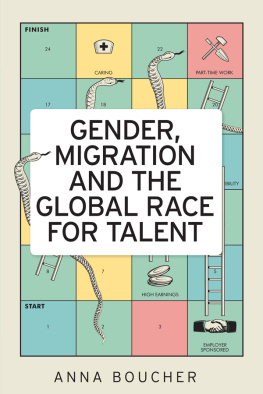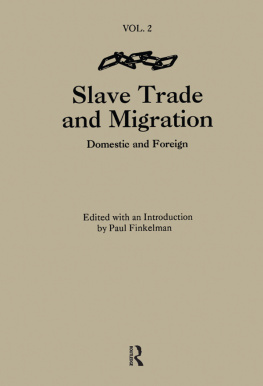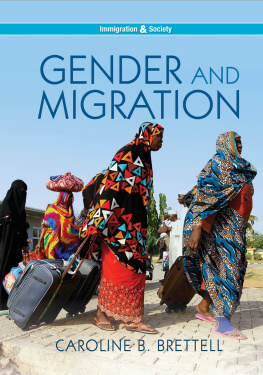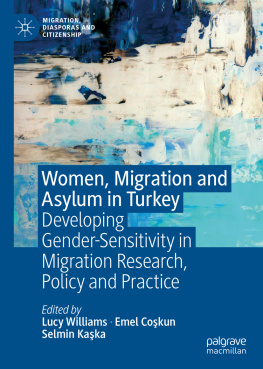GENDER, MIGRATION AND DOMESTIC SERVICE
For my mother, Joan, and my father, Bill
Gender, Migration and Domestic Service
The politics of black women in Italy
Jacqueline Andall
University of Bath
First published 2000 by Ashgate Publishing
Published 2016 by Routledge
2 Park Square, Milton Park, Abingdon, Oxon OX14 4RN
711 Third Avenue, New York, NY 10017, USA
Routledge is an imprint of the Taylor & Francis Group, an informa business
Copyright Jacqueline Andall 2000
All rights reserved. No part of this book may be reprinted or reproduced or utilised in any form or by any electronic, mechanical, or other means, now known or hereafter invented, including photocopying and recording, or in any information storage or retrieval system, without permission in writing from the publishers.
Notice:
Product or corporate names may be trademarks or registered trademarks, and are used only for identification and explanation without intent to infringe.
British Library Cataloguing in Publication Data
Andall, Jacqueline
Gender, migration and domestic service: the politics of
black women in Italy. - (Interdisciplinary research series
in ethnic, gender and class relations)
1. Women, Black - Employment - Italy 2. Women domestics
Italy - Social conditions 3. Women, Black - Italy - Social
conditions 4. Women - Italy - Social conditions 5. Sex role
Italy 6. Discrimination in employment - Italy
I. Title
331.4'0896'045
Library of Congress Control Number: 00-134478
ISBN 13: 978-0-7546-1088-5 (hbk)
Contents
Dr Jacqueline Andall introduced me to this work during a two-week summer school that we both attended on the Greek island of Hydra. She discussed aspects of the research with me and I was fascinated. I am glad that she decided to publish her book with Ashgate because this is a most welcome addition to the Interdisciplinary Research Series in Ethnic, Gender and Class Relations.
The author notes how the gender debate in Italy had been ideologically de-racialised in both official discourse and academic discourse. She argues that the colour blindness of the gender debate in Italy, coupled with her own biography as a black British citizen of Caribbean origin, left her with little choice but to adopt the black feminist perspective that privileges an articulated understanding of race, class, gender relations in preference to the gender atomisation of the reality of migrant black women who work as domestic servants.
Whereas the post-fascist Italian constitution states that female workers are entitled to the same pay as male workers for the same work, the book exposes the contradictions inherent in the sameness of work principle especially in such jobs as domestic service where immigrant black women were more likely to find employment. This contradiction also affects Italian women because the constitution states that they should fulfil their maternal duties along with their public functions. However, the contradiction of work sameness is resolved for middle-class Italian women by the presence of poorly paid immigrant domestic servants who make it possible for the native women to seek sameness of pay outside the domestic setting with men who do the same types of work.
The author argues that the presence of immigrant female workers represents significant changes in Italian history a history of predominantly white male emigration now replaced with a more recent history of predominantly racialised female immigration. At the same time, restrictive employment practices, reinforced by restrictive immigration policies make it clear that the constitutional protection of gender roles does not apply to immigrant women at all even though there is great demand for their cheap labour by privileged Italian families.
This lack of protection for immigrant women is made worse because many domestic workers are required by their middle-class employers to 'live in' and such working conditions frustrate their own wishes to fulfil maternal roles of their own. Moreover, the job of a domestic worker remains very insecure given that she could be sacked even after six years of service with no benefits and she could be forced to seek a new job even while heavily pregnant.
This book offers a sober alternative to the sensational pornographic coverage of the presence of black women in Italy. Tabloid newspapers give the misleading impression that most black female immigrants in Italy work in the sex industries but the author de-sensationalises the debate by analysing the hidden struggles for survival being waged by under-paid, over-worked, and de-sexualised black women in Italy's domestic industries.
Dr Biko Agozino
Associate Professor
Indiana University of Pennsylvania
This book has benefited from the contribution of a number of people. I would like to thank my mentor, Prof, Gino Bedani, for fostering my interest in Italy, commenting on my research and being a source of constant support. I am also grateful to Prof. Anna Bull for reading the bulk of this research and providing constructive suggestions for improvement. I would like to acknowledge the financial support of the British Academy and thank the research committee in the Department of European Studies, University of Bath, for granting me study leave to complete this work. This book has additionally benefited from the comments of participants at a number of conferences and seminars. I would like to particularly thank the organisers and participants of the ERCOMER conference on migration, Utrecht 1996; the Municipality of Rotterdam's conference on Cape Verdeans and cities in Europe, Rotterdam, 1996; the University of Melbourne's conference on the state of contemporary Italy, Melbourne 1997; the University of Bath's Women's Centre seminar on gender and ethnicity in Europe, Bath 1997 and the University of Miami's conference on Africa/Italy, Ohio, 1998.
This book would not, however, have been possible without the participation of the female migrants of my case-study and I am especially grateful to all of the women who gave up their limited time to share their experiences with me in Rome.
During my fieldwork in Rome, I received assistance from a wide range of people. I would like to especially thank Antonia Bento, Tewodros Bekele, Francesca De Fazi, Teresa Savini and Alfredo Zolla. Residents and staff at Rome's Citt dei Ragazzi made me particularly welcome. Librarians at the ACLI's national archives and at the CIES research centre provided me with much assistance. For fieldwork assistance in Rotterdam, I would like to say a special thank-you to Pedro Landim and Dr Joke Van der Zwaard. Alfredo Silva was also a great help in Paris.
My frequent visits to Rome have been made all the more enjoyable as a result of time spent with my adopted Italian family. Ancilla Ferrara and Luigi Troina have never ceased to show me the true meaning of friendship and in recent years, their daughter Elettra has added a new dimension.
I would like to thank my sister, Gleny s Andall, for being a source of support throughout this project. For computing assistance, I wish to acknowledge Mark Robertson. For introducing me to 'pan', I would like to thank Toussaint Clarke, Hallam Ifill and Michael Toussaint. My Thursday evening sessions with Rainbow Steel Orchestra, Bath, were more than a welcome diversion. Thanks also to my extended family, the Cardiff posse and Eleanor Grant for friendship and support.


